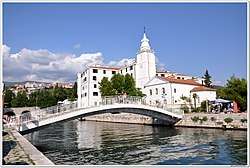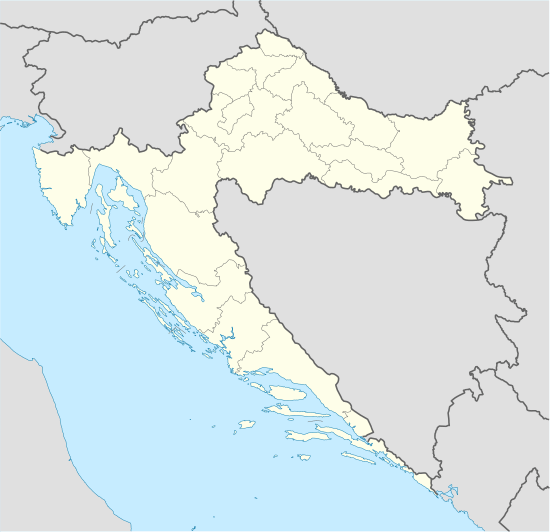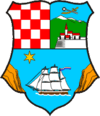Crikvenica
Crikvenica (Croatian pronunciation: [ˈtsrikvɛnitsa]; Latin: Ad Turres, Italian: Cirquenizza, Hungarian: Cirkvenica, Cirkvenicza, Czirkvenicza, Czirkwenicza, German: Cirknenz)[2] is the largest settlement on the coast of the Vinodol coastal area, Croatia, and developed on the site of Roman era settlement and military base called Ad Turres. It had a population of 6,860 in the urban area and municipal population of 11,122 at the 2011 census.[3][4] The city is situated on the Adriatic near Rijeka in the Primorje-Gorski Kotar county. In the last twenty years, due to urban expansion of Crikvenica itself and expansion of the nearby town of Selce, the two were merged into a mini-conglomerate.
Crikvenica | |
|---|---|
| Grad Crikvenica Town of Crikvenica | |
 Crikvenica | |
 Crikvenica Location of Crikvenica within Croatia | |
| Coordinates: 45°10′N 14°41′E | |
| Country | |
| County | |
| Government | |
| • Mayor | Damir Rukavina (HDZ) |
| • City Council | 17 members[1]
|
| Elevation | 0 m (0 ft) |
| Population (2011) | |
| • Total | 11,122 |
| Time zone | UTC+1 (CET) |
| • Summer (DST) | UTC+2 (CEST) |
| Postal code | 51 260 |
| Area code(s) | 051 |
| Website | www |
Towns near Crikvenica include Kraljevica, Selce and Novi Vinodolski.
History
Old Crikvenica was originally an offshoot of the village of Kotor, which is located on a nearby hill and shares its name with that of the village.
The name of the town derives from the word for 'church' (Croatian: crkva, in dialect crikva), referring to the monastery church of the Pauline Fathers, which was built by Nikola Frankopan nearby in 1412. Beside the church and the monastery at the mouth of the Dubračina, the nearby port of Grižane grew up. In 1760 the local worthy moved from Bribir to Crikvenica and thus it became the centre of the whole Vinodol coast. In the 19th century Crikvenica began to attract many tourists, which brought about a turning point in its history. In 1877 a harbour was built in Crikvenica, in 1888 a bathing beach and as early as 1891 the first hotel had opened. In 1895 the Hotel Therapia was opened with 120 beds and a Hydrotherapy Institute. In 1902 the Hotel Crikvenica was built, in 1903 the Bellevue and in 1905 the Miramare. In 1906 Crikvenica became officially a health resort and due to its favourable climate, in the space of just 16 years Crikvenica became the most important resort on the riviera.[5] Today, together with Selce, it is one of the most attractive parts of the Kvarner coast, as well as of the North Adriatic coast of Croatia in general.
In the late 19th and early 20th century, Crikvenica was a district capital in the Modruš-Rijeka County of the Kingdom of Croatia-Slavonia.
Notable people
- Josif Pančić (1814–1888), botanist
- Ljerko Spiller (1908–2008), Croatian and Argentine violinist
- The family of Argentine Cardinal Estanislao Esteban Karlic (born 1926) came from Karlići, a small village approximately 5 kilometers (3.1 mi) outside Crikvenica[6]
Photo gallery
 Viaduct passing through the town
Viaduct passing through the town Port of Crikvenica
Port of Crikvenica- Town park
 Dramalj
Dramalj Nighttime view of the town
Nighttime view of the town Crikvenica Town Hall
Crikvenica Town Hall Monastery (today Kaštel Hotel) and Church of the Assumption of the Blessed Virgin Mary
Monastery (today Kaštel Hotel) and Church of the Assumption of the Blessed Virgin Mary- Cave lion skull found in Vrtare male cave
See also
References
- "Konačni rezultati izbora" (in Croatian). Retrieved 31 May 2017.
- Richard Talbert, Barrington Atlas of the Greek and Roman World, (ISBN 0-691-03169-X), Map 20, notes.
- "Population by Age and Sex, by Settlements, 2011 Census: Crikvenica". Census of Population, Households and Dwellings 2011. Zagreb: Croatian Bureau of Statistics. December 2012.
- "Population by Ethnicity, by Towns/Municipalities, 2011 Census: County of Primorje-Gorski kotar". Census of Population, Households and Dwellings 2011. Zagreb: Croatian Bureau of Statistics. December 2012.
- Naklada Naprijed, The Croatian Adriatic Tourist Guide, pg. 27, Zagreb (1999), ISBN 953-178-097-8
- "Karlić: Nikada nemojte zaboraviti svoje podrijetlo i svoje običaje". Jutarnji list (in Croatian). 2008-02-17. Archived from the original on 2010-03-01. Retrieved 2011-01-18.
